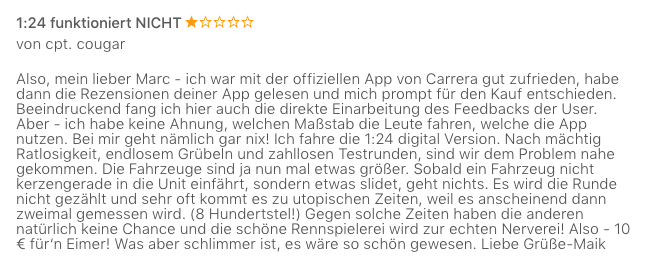Bad reviews are a thorn in the side of any halfway dedicated app vendor for a variety of reasons. Not only are they bad for the image of the app (and the developer), but they also cause a lot of frustration. Often, users don’t rate 1-star for objective reasons, but out of pure annoyance and frustration. In many cases, the problem would be quickly resolved – if you as a developer had a halfway meaningful way to communicate with users. But that is where the problem lies.
By the way: Bad ratings are an opportunity
First of all, you should always check whether the criticism of the user, who has rated with one or two stars, is justified. It helps to remain objective and put yourself in the user’s position. What is the user criticizing? Does his criticism indicate a fundamental problem with the app? Does the usability of the app need to be improved in order to better meet the needs of non-savvy users? Is the interface too complicated? Criticism is always an opportunity to address areas for improvement and to develop further. That’s why you should never just shoot back, but patiently read, understand, and react.
Rating system on Google Play
Google has long since found a solid and user-friendly solution with regard to app reviews. Users submit a rating (called a “review” if it contains text) and the developer is immediately (and I really mean immediately, which is usually within a few seconds) informed by mail (if configured). The mail contains all the info the developer needs to respond. If the developer responds to the review, the user in turn immediately (see above) receives a mail (and/or a push notification) informing him about it. This is often a quick and easy way to get in touch and get issues out of the way. This has worked very well for SmartRace in the past, the vast majority of frustration ratings could be clarified in personal contact and quite a few users did not just delete the rating afterwards, but changed it to 4 or 5 stars. The situation is different with Apple.
Rating system in the Apple App Store
For a long time, developers could not respond to user reviews at all. During this time, the motto was simply: ignore all reviews, you can’t do anything about it anyway. Since 2017, however, you can respond. And that looks like this:
- The user submits a review
- The developer is informed about it only after more than 24 hours
- The developer replies to the review
- The publication of the response again takes up to 24 hours
- The developer’s reply ends up in the user’s spam folder, which is why in the vast majority of cases the user never sees it.
For a long time, iOS developers could not respond to user reviews at all. During this time, the motto was quite simple: ignore all reviews, you can’t change anything about it anyway
What sounds like a joke is unfortunately reality. The response rate of users to developer replies is so low for iOS/macOS that the function could basically be dispensed with directly. The result is that an extremely large number of 1-star ratings, the cause of which could be clarified in one sentence, remain forever and unsettle other users. I relatively often receive mails from users who are considering buying SmartRace, but have read such reviews and are therefore not sure whether the app will meet their requirements.
Examples
There are many examples that support this. I have picked out two that show how such ratings can unjustifiably unsettle other users. And of course, it’s also a shame for the users who submitted the review: They must believe that I as a developer would not react and leave them alone with their problems.

(Translation of the review in the image: After one of the most recent updates all of my premium contents are gone. Impudence. Not recommended).
One thing first: Of course, once purchased, in-app purchases are never lost. But if you reinstall SmartRace, change devices, or don’t use the app for a long time, your purchases may have to be recognized again. To do this, simply open the Add-Ons dialog and press the green “Restore Purchases” button (also available here). The (understandable) frustration of the user would quickly disappear.
(Translation of the review in the image: So, my dear Marc – I was well satisfied with the official app from Carrera, then read the reviews of your app and promptly decided to buy it. Impressive. I catch here also the direct incorporation of feedback from users. But – I have no idea what scale drive the people who use the app. For me, nothing works at all! I drive the 1:24 digital version. After much perplexity, endless pondering and countless test rounds, we have come close to the problem. The vehicles are somewhat larger. As soon as a vehicle does not enter the unit straight, but slides a bit, nothing works. The lap is not counted and very often it comes to utopian times, because it is apparently then measured twice. (8 hundredths!) Against such times, of course, the others have no chance and the beautiful racing game becomes a real nuisance! So – 10 € for a bucket! But what is worse, it would have been so nice. Greetings-Maik
This review really frustrated me a lot. Of course, SmartRace also works flawlessly with 1:24 scale vehicles. And of course, it makes no difference at all which app you use in terms of scale: Because all other apps work with the exact same data as SmartRace, namely the data provided by the Control Unit. In other words, whatever is going on there, SmartRace cannot do anything about it. An exchange would have been very desirable here, because each of these problems could certainly have been clarified. But instead, this review will probably remain forever and there are certainly users who now believe SmartRace is unsuitable for 1:24 scale. Thank you Apple!
What can you do as a developer?
Of course, Apple users can’t know how many gray hairs the problems with the unspeakable rating system cause developers like me. Therefore, the blame clearly lies not with the users, but with Apple. But how can developers help themselves? And how can you help users give their feedback in other ways?
Offer assistance and contact options directly in the app
There is really only one way to contain this dilemma (you can’t prevent it): You have to try to pick up the user as best as possible directly in the app. On the one hand, by providing concrete help at neuralgic points (e.g., through popups/dialogs that link to articles in the knowledge base), and on the other hand, by using conspicuous call-for-action buttons to contact the user, if the user so desires. And then we can only hope that the user accepts these offers.




